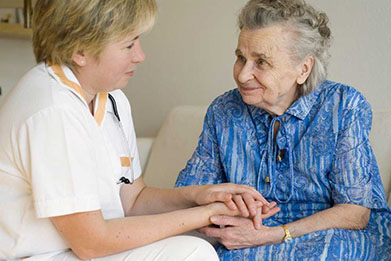The post Caring for Someone With Dementia appeared first on Lakeside Manor.
]]>Hence, you must prepare yourself for the challenges that lie ahead. Whether you’re a family member or a professional caregiver, you must keep in mind that an elderly with dementia needs patience. It is difficult for someone with dementia to think, remember, and communicate with others. They may even forget to care for themselves. Elderly folks suffering from dementia can be moody and cranky. In the worst-cases, it can even change the personality of your once sweet senior. How can you handle this situation when you’re not a trained medical professional?
Remember, the right attitude is critical for successful care. Learning more about the diagnosis can help you understand your elderly loved one. It also allows you to set realistic expectations and retain control as the caregiver. When you know what pitfalls and challenges to expect, you can plan ahead and take the sting out of your new responsibilities. Furthermore, the right mind frame assures you to retain a more positive attitude despite this harsh prognosis. Here are some vital things you must consider when caring for an elderly loved one with dementia.
Do Work On Communication Skills to Foster Better Interactions
Keep in mind, communicating with a person with dementia takes effort. But it is something that you can readily learn. With proper communication, you can make caregiving less stressful. Furthermore, you can anticipate a better relationship. Expressing yourself properly will help manage any difficult behavior or attitudes that you may encounter. Try the following techniques:
1. Establish a positive mood
More than words, your body language can convey your inner thoughts and feelings. Hence, strive hard to establish a positive mood to ensure a good interaction. Your tone of voice and facial expressions must always be pleasant, cordial, and respectful.
2. Work on getting the right attention
Before you speak, make sure you have the person’s undivided attention. Turn off all distractions like the TV, radio, or computer. Address the person by name and remind them of your relationship. Maintain eye contact to get them to concentrate on your words.
3. Give a clear, succinct message
Remember to speak slowly and use simple words. Be mindful of your tone because it can hurt their feelings. If your elderly loved one doesn’t understand, patiently repeat or rephrase your words. Break everything down into a series of manageable instructions.
4. Listen not only with your ears
When dealing with dementia, you must be patient in waiting for a reply. Sometimes, you must use more than your ears to listen. Look at body cues and overall demeanor. Help supply words when they are grappling for it. Listen with your heart to comprehend their emotions.
5. Respond with love
An elderly loved one with dementia feels insecure. They often feel anxious, confused, and scared. Often, they can mix up facts and remember the wrong things. As such, you need to be patient in explaining. Speak in a soothing tone and use gentle words. Hold their hand, touch them, and pat their back. Offering kindness and love will go a long way.
Don’t Be Afraid to Ask for Help and Seek Support
Whether you need to take care of someone in your family or doing so as your profession, never be afraid to seek a helping hand and ask for support. Support groups and organizations can help family members and professionals tremendously. With your group, you can vent your frustrations without any judgment. Since everyone is going through the same thing, you can share coping tips and tricks with one another. A group is a good place to find resources about dementia. Other pro caregivers can also give you their professional insight to apply in caring for your elderly loved one.
Furthermore, professionals should never feel ashamed to ask a colleague for support. Everyone in the healthcare profession understands that caring for someone with dementia is difficult. Hence, there will be moments that even professionals need a friendly ear. Someone to talk to can help unburden you from the stress you feel.
Do Exhibit Compassion and Empathy
Quality care always springs from a compassionate heart that empathizes with the plight of a sick person. This mantra holds true for every human relationship, but it becomes even more important for those who care for people with dementia. To illustrate, a person with dementia can get confused about the time of day, where they live, and who their family members are. This situation is truly heartbreaking!
Thus, it would help to put yourself in the person’s shoes. How would you want to be treated if you ever find yourself not knowing who you are and feeling disoriented about your new assisted-living community? Actively empathizing with the senior in your care can help you become more conscientious of your actions. After all, everyone will eventually enter the twilight of their years. When you experience this season of life, you certainly want everyone to care for and respect you, even if you suffer from dementia.
Don’t Believe the Myth that Dementia is Only Memory Loss
It is an understatement to say that dementia is merely memory loss. However, memory loss is one of the symptoms of dementia. Some dementia cases, such as Pick’s disease and frontotemporal dementia, exhibit personality changes. Remember, the brain has different lobes, so the symptoms that manifest can vary depending on the location affected by the disease.
Noteworthy, memory loss is often the most obvious symptom that exhibits the person is suffering a neurological decline. Sadly, this can lead to many other issues, such as combative behavior and terrible mood swings. To illustrate, it is highly likely that a lady-like grandma will start cussing like a veteran sailor in rough seas. It is normal for dementia patients to experience delusions and even hallucinations. In some cases, an elderly person can even begin to think that his family members plot something evil against him.
In the advanced stage of most kinds of dementia, the patient may be non-functioning. As a result, you will find them unable to dress themselves, brush their teeth, or even eat. Incontinence may also be a problem. When the self-care abilities are gone, you may need a permanent caregiver all the time or consider seeking a dementia facility for help. Dementia patients who lose their ability to communicate and identify people or things can end up getting lost. It is truly heart-wrenching to see someone who was once so lively become unresponsive. Thus, seeking professional help is crucial when they can no longer live independently.
Do Set Realistic Expectations
Though it is vital to stay positive, you must also be realistic about the disease. Though it may sound harsh, the sad reality is that dementia is often an irreversible and progressive disorder. In fact, prepare for things to get worse over time. There is no known cure for this disease, so manage your expectations and plan accordingly. What you can do is to ensure that the person in your care is always comfortable and safe. You can try the following:
- GPS tracking apps
- Digital clocks with reminders
- Communication aids
- Home monitoring devices
- Security cameras
- Home care bots
- Medication management tools
Remember, most professionals share that dementia patients often have good days and bad days. For best results, always try to prolong the good days by ensuring your elderly loved one is not agitated or stressed. Providing a relaxed environment without excessive stimuli can help them stay calm. Feeding them a healthy diet that maintains their blood pressure and sugar levels will ensure better days ahead.
Don’t Forcefully Correct or Be Mean About Troublesome Behavior
Personality and behavioral changes are the biggest challenges when caring for a loved one with dementia. Most become irritable when they cannot remember things or do what they like. Some become combative when you restrict their movements for their own safety. Sadly, they no longer have the mental faculties to process that what you are doing is for their own good.
In cases like this, you must once again be patient, compassionate, and understanding. Don’t take things personally and strive to maintain a good attitude. To help you out, consider the following:
1. Change how you respond
Remember, you cannot correct nor change a person with dementia. It is an incurable disease. When you attempt to modify their behavior and attitude, you will most likely fail. Most of all, they will resist. Hence, it is better to change how you respond because you still have control over your behavior and reasoning.
2. Check with the primary care provider
Sometimes, when the behavior becomes too much, you need to consult their doctor. It could be an underlying medical issue. Your elderly loved one could be in pain. It could also be a side effect of a medicine. Seek the doctor’s advice to help you sort things out.
3. Consider the various triggers
Often, how a person with dementia reacts is based on a trigger. Sometimes, it could be something as simple as the weather. It could also be what they ate that day or the noise they heard that got them overstimulated. Be more observant in assessing their disruptive patterns. Through proper evaluation, you can find triggers and avoid them.
4. Understand the reason behind it
Since people with dementia cannot eloquently express what they want or need, they can act out. Sometimes, this manifests through erratic behavior, such as throwing out all the clothes from the closet. When this happens, understand the reason behind the behavior. What could your elderly loved one be trying to do or express? Try the best you can to accommodate them.
Do Everything to Prevent Wandering and Avoid Getting Lost
It is often common for people with dementia to wander around. They walk aimlessly even if they have no clue how to return. This could be a potential and serious problem that you have to consider. With poor memory, they can get lost permanently. To help you manage this behavior, consider the following:
- Include regular exercise to prevent restlessness and boredom.
- Consider installing smart locks that they cannot open but are accessible to others.
- Put a barrier on the main entryway, like a curtain to camouflage the door.
- Add child-lock covers on doorknobs to prevent accidents.
- Install security cameras to keep watch over your elderly loved ones.
- Sew name, contact number, and address labels on clothes.
- Inform neighbors about this problem so they can help keep watch.
Do Make Concrete Plans for the Future
When caring for someone with dementia, change is an inevitable part of the course. Remember this detail, so you won’t get used to a routine or status quo. As this disease is progressive, you must prepare for when you need to bring your loved one to a professional memory care facility with a residential option. As such, you need to check your finances and scout your area for a good nursing home. You must face the fact that care needs will increase as your elderly family member’s condition deteriorates. Thus, you must eventually transition your loved one into a reputable adult-living community.
If you need help, you can get in touch with us at Lakeside Manor. Our team understands that it is difficult to pick a care facility for your loved one. After all, you want quality care you can trust, as well as a good team that your beloved family member is comfortable with. Don’t hesitate to call and ask us any questions if you need additional information. We also invite you to tour our community to see how we spend our days with our lovely seniors.
The post Caring for Someone With Dementia appeared first on Lakeside Manor.
]]>The post Improving Quality of Life for Dementia Patients appeared first on Lakeside Manor.
]]>In reality, people in the earlier stages of dementia can do a lot of the things they’ve always done. They want to feel like they make a difference and contribute to their family’s and friends’ lives. As the disease progresses, they will need supervision and assistance to ensure their safety. But that doesn’t mean they can’t continue to be functional and happy for most of the time they have left.
The type of care dementia patients receive, as well as their living environment, greatly influence the joy they continue to get from life. The right type of care provides a better quality of life for the patient and reduces the stress of the caregiver. Here are some ways to support a healthy life for dementia patients so they can make the most of each day.
– Start by Establishing a Routine
Dementia patients lose the ability to recognize time in the way they once did. They get confused about when it’s time to do certain things. This confusion often gives way to frustration. Establishing a routine helps them relate to time in a different way. They may not know that they go for a morning walk at 9 in the morning and then have breakfast at 10. But they will know that their walk is the first thing they do after they get up in the morning and that they have breakfast when they get back inside. A routine helps eliminate the confusion and makes them feel safer and more comfortable.
– Create a Safe, Familiar Living Environment
Familiarity is the key to creating a comfortable living environment. Surprises like rearranging the furniture, or even a new bedspread in their room, can confuse them.
What kinds of things did they enjoy and find relaxing before their diagnosis? Was there a certain type of music they appreciated? Find out what kind of movies they liked. If they can’t provide answers, their family members probably can. Once you know what the person needs to help them relax, you can enjoy it together.
Spirituality is important to many people. That doesn’t go away with a diagnosis of dementia. The person might enjoy listening to sermons on TV, on audio tapes, or on the internet. Hymns that are performed with soft instruments can help them relax and provide a sense of calm. Just make sure your selections are appropriate for the person’s beliefs.
– Add Meaningful Activities
Dementia patients want to feel useful. Don’t assign them busywork just to occupy their time. Look for ways they can contribute to the workload. Some examples include:
- Folding laundry
- Dusting
- Grooming/walking a pet
- Organizing household items
- Tend the garden
- Setting the table
Activities become much more meaningful when they are things the person enjoyed doing in the past. The activities need to fit the individual. For example, a man who took care of the household repairs or worked on the family’s vehicles won’t feel useful washing the dishes. He might prefer something like helping you wash the car or fitting together pieces of pipe.
Other activities like working puzzles, doing arts and crafts, and playing music also have meaning. They help boost self-esteem and improve cognitive function.
– Engage in Conversation
Caring for a person with dementia takes a lot of time, energy, and patience. When there’s a lot to be done, it’s easy to overlook the need to just sit down and talk with them. Expressing their thoughts is important to them and to you. It helps you identify their needs and feelings so you can be a better caregiver. Patients who can’t remember what happened hours or minutes earlier can often recall older memories in great detail. This is something that usually gives them a great deal of pleasure.
One way to help is by using family photos. Look through the albums together and let them tell you about the photos they recognize. You can repeat this activity frequently without them getting tired of it. If they don’t always get the names or stories right, just ignore it. It isn’t unusual for their recollection of events to change daily.
– The Do’s and Don’ts of Caregiving
Spend your time together with the goal of helping the patient relax. They need to know they are in a safe environment where they feel somewhat in control. To help create a safe and comfortable environment:
- Do – adjust activities to meet the skill level of the patient. The best activities provide a challenge while also giving them a sense of accomplishment. Choose activities that aren’t too simple or too difficult. The last thing you want is to cause the patient to become frustrated.
- Don’t – be condescending or disrespectful. Dementia patients are like children in many ways. They require supervision and help with many of the things they do. But they are adults who have lived long, purposeful lives. They deserve respect and consideration throughout every phase of their disease.
- Do– get to know the patient and what is important to them. Create activities that fit the individual’s likes and avoid their dislikes. Keep in mind that just because they did something in their past, it doesn’t mean they enjoyed it.
- Don’t– correct their mistakes. There is no ‘right’ and ‘wrong’ with how they perform activities. Your job is to guide them when they need it, not take it over and do it for them.
- Do– give them all the time they need. Practice patience and keep the environment relaxing and fun.
- Don’t– try to force them to participate in activities they don’t want to do.
- Do– allow room for creativity. It’s more about self-expression than creating a fine work of art.
Providing care to a loved one is often more challenging than people realize. It takes a certain type of person and a lot of spare time to provide the level of care that improves the person’s quality of life.
If you are struggling to balance your role as caregiver with the other responsibilities in your life, there is a better solution. Contact Lakeside Manor to learn more about our specialized dementia care. Our assisted living and memory care services are focused on providing the best quality of life to dementia patients at every stage of the disease.
The post Improving Quality of Life for Dementia Patients appeared first on Lakeside Manor.
]]>The post A Warning to Dementia Caregivers appeared first on Lakeside Manor.
]]>Caring for a person with a physical disability is challenging enough. Few people are prepared for the challenges they will face when their loved one begins to lose their identity. During the first stages of dementia, the symptoms may be limited to forgetfulness and an inability to concentrate. They may not be able to complete tasks as efficiently as they used to. Caring for your loved one might be as simple as providing them with medication reminders. You might help them with household chores like cooking and doing laundry.
Failing to accept what is happening to your loved one is a danger to them and to you. Dementia is a progressive disease. During the later stages, your loved one will become more demanding. You will have to do more of the physical tasks they have always done for themselves. Although the physical demands can be overwhelming, many dementia caregivers find the emotional demands to be the most challenging. They often fail to recognize behavior changes until after something happens that could be a danger to their loved one or to someone else. Their denial that their loved one has a serious disease eventually becomes impossible to uphold. As the level of responsibility grows, so does the frustration and stress, and the potential for serious risks.
Greater Risk of Accidents
Elderly people already have a high risk of falling due to a decline in balance, osteoporosis, and vision problems. People with dementia are at an even greater risk of falling. Dementia patients are also three times more likely to sustain a hip fracture. Once walking becomes more difficult, you have to be careful about leaving them unsupervised.
The potential for accidents and injuries increases in every area of the home. The decline in physical abilities coincides with their mental decline. Leaving the stove on, starting fires, cutting themselves with a knife, or eating excessive amounts of odd foods are just some of the things dementia patients do. They may even try to catch you not watching so they can do some of these things and more. You have to watch them constantly to keep them safe.
Dangers from Medications
Most dementia patients are on medications to reduce memory loss. Seniors also take medications for common health conditions like high blood pressure, diabetes, or other conditions. At first, you might use a daily pill dispenser to help keep the dosages straight. All your loved one needs is a reminder when it’s time to take a pill.
Over time, your loved one will be at risk of overdosing. The problem is that you may not realize that today is the day their behavior will change. To keep your loved one safe, the pills need to be put away. Dispensing them on time with every dosage is now your responsibility.
Family Conflict
One child in an entire family acting as the primary caregiver is usually the rule and not the exception. You spend hours with your loved one each day. If your siblings observe from afar and only pay occasional visits to your parent with dementia, they don’t see the impact dementia has had on their life. They might accuse you of overreacting, denying that their parent needs the level of care that you have told them. The only help they offer is advice on what you should or shouldn’t doing. These constant interactions with your siblings or other family members only add to your burden and stress.
Delayed Professional Help
Dementia caregivers have different reasons for denying their loved one’s disease. Misplaced guilt, shame, or simply not wanting to accept the inevitable outcome, to name a few. The time you spend denying your loved one’s dementia is real or that it will get worse is time wasted. Dementia is a progressive disease, caused by damage to brain cells. Once that damage occurs, it can’t be reversed. There are medications, however, that can slow its progression. The sooner you get your loved one the professional treatment they need, the more quality time you will have together. Don’t miss your chance to share special memories with your loved one.
The Impact on a Dementia Caregivers Health
Denial increases the impact that caring for your loved one will have on your health, too. For the reasons listed here, and many others, there is a greater physical and emotional demand than most caregivers anticipate. There’s also a bigger demand on their time, leaving little room to take care of themselves.
Failing to accept the true impact dementia will have on your loved one can damage your health and take years off your own life. The mortality rate for caregivers is 63% higher than for other people with similar demographics. The risk is the greatest for caregivers over the age of 66. Often, they die before the person with dementia does.
Consider Your Options Carefully
The decision to care for a spouse, parent, family member, or friend with dementia in their home isn’t always the best one. The average person lacks the skills to provide the level of services their loved one needs. In comparison, a dementia assisted living facility considers all the potential changes that your loved one goes through. They offer a staff of skilled dementia caregivers and a safe, secure environment. Placing your loved one into dementia assisted living will help keep them active and happy for as long as possible. It also allows you to take on the role of a loved one and enjoy special memories that you would otherwise miss.
If you have a loved one with dementia, contact Lakeside Manor to schedule a tour of our facility. You do have other options that offer a better quality of life to you and your loved one. Let us help you make the most of every minute you have left together.
The post A Warning to Dementia Caregivers appeared first on Lakeside Manor.
]]>The post San Diego Memory Care and the Seven Stages of Dementia appeared first on Lakeside Manor.
]]>Doctors often use the Reisberg Scale, often called the GDS, to separate the seven stages of the disease. Although this scale includes multiple stages within the categories of “No Dementia” and “Mid-Stage Dementia”, it further separates the symptoms for a more accurate diagnosis. This is essential for developing the right treatment plan since there is no specific test for diagnosing it. Also, there are medications that help to slow the progression of the disease but symptoms cannot be reversed.
Medications are used to treat the different symptoms of dementia. Some treat memory loss while others are used to treat behavioral changes or sleep disorders. Most of these drugs are only effective during the early stages and for a short period of time. The most valuable thing you can do for your loved one is to get quality San Diego memory care that will keep their mind active as long as possible.
The Seven Stages of Dementia:
Stage 1
People who experience no memory loss and are mentally healthy are considered stage 1. According to the scale, every person without dementia is classified as Stage 1.
Stage 2
Those in Stage 2 have very mild cognitive decline. They experience occasional forgetfulness that appears to be normal for their age. You aren’t likely to notice these symptoms and neither is their physician.
Stage 3
This stage of cognitive decline includes more frequent forgetfulness and the beginning of a decline in concentration. The person in Stage 3 dementia often performs normal tasks less efficiently. They may have problems finding the right words or get lost when going places they are familiar with.
The people who live with the person may notice the symptoms during this stage. It is more difficult to realize the decline in their cognitive abilities from a distance. On average, Stage 3 lasts for seven years before progressing to actual dementia.
Stage 4
During Stage 4, the person experiences a moderate cognitive decline. They begin to forget attending recent events and have problems managing their finances. They may be unable to travel to new locations without getting lost.
It isn’t unusual for people in Stage 4 to withdraw from their loved ones because of the difficulties they have socializing. Loss of memory and problems recalling names or finding the right words makes it difficult to socialize. Physicians can detect a decline in cognitive abilities by examining the patient and interviewing them. Denial of their symptoms sometimes makes them resistant to doctor’s appointments. Stage 4 lasts an average of two years.
Stage 5
During this stage, loss of memory is more pronounced. Most people require help performing normal daily activities such as preparing meals and bathing. During Stage 5, the need for professional and compassionate San Diego memory care may be necessary. People who live alone often stop doing daily tasks like bathing. They may wear the same clothes day after day and have difficulty distinguishing day from night.
Stage 6
People in Stage 6 dementia often forget the names of those closest to them. They can’t remember recent events and often recall some details of events from the past. They are unable to complete simple tasks and their ability to speak diminishes. Loss of bladder and bowel control often occurs and personality changes begin to take place. Stage 6 dementia patients often believe things that aren’t true, begin to show compulsive behavior, and they may become anxious or agitated. Caring for the person becomes difficult to impossible for loved ones as the person becomes more resistant to performing normal activities.
Caregivers in a specialized San Diego memory care facility know the special needs of dementia patients in every stage. They have the skills and the experience to provide their residents with the physical care they need while also providing activities that bring them greater happiness and quality of life. Taking care of a loved one with dementia is more than a little challenging. Getting the advanced level of care they need from a memory care facility is the best choice for the patient and for their family members.
Stage 7
The final stage in the scale is very severe cognitive decline. During Stage 7, the person is no longer able to speak or communicate and they often can’t walk. They need help with almost everything they do including eating and using the toilet. Stage 7 lasts an average of two-and-a-half years.
The Need for Dementia Care
As you can see from these stages, dementia is more than simple memory loss. Although the time period of each stage varies among patients, the disease progresses over a period of several years. Although many people continue to care for themselves during the first two stages, obvious changes in their abilities and behaviors begin to take place during Stage 3. By the time they enter Stage 4, their abilities decline. How long they are safe in their own homes depends on the individual and their rate of decline in cognitive abilities.
In addition to memory loss, dementia also increases the risk of falls. The patient may forget to take medications or forget that they have already taken their medications. They could forget to turn off the stove and may leave food cooking unattended.
During the earlier stages, the person will be able to prepare and eat nutritious meals, take safety precautions while walking and showering, and even take care of their finances. Over time, these simple tasks become overwhelming and put them at risk of fires, falls, and other health and safety risks.
Once your loved one is no longer safe in their own home, it’s time to look into San Diego memory care. Contact Lakeside Manor to schedule a tour of our facility and get the special care you need for your loved one and for your peace of mind.
The post San Diego Memory Care and the Seven Stages of Dementia appeared first on Lakeside Manor.
]]>The post Nine Top Risk Factors for Dementia appeared first on Lakeside Manor.
]]>
Nine Top Risk Factors for Dementia
Age
Age is the strongest risk factor for dementia. Although it is possible to develop dementia at a younger age, the vast majority of cases occur in individuals aged 65 or over. In fact, once you pass the age of 65, your risk of dementia doubles roughly every five years. While there is nothing you can do to stop the ageing process, you can focus on ageing well to help stave off physical and cognitive decline.
Family History and Genetics
Scientists have discovered numerous genes that play a role in whether or not a person will ultimately develop dementia or Alzheimer’s. Some of these genes are considered risk genes, meaning they increase the likelihood of developing the condition while not directly causing it. There are also a few deterministic genes that guarantee a person will develop dementia at some point in their lives. If you have others in your family with the disease, your risk is greatly increased as well, multiplying for each additional family member with the condition.
Frequent Head Injuries
Researchers have found a strong link between head injuries and cognitive decline. The risk is increased even more when head injuries occur frequently and when the person loses consciousness. The best way to minimize your risk in this area is to employ basic safety practices, like always wearing a helmet when riding a bike and a seat belt when driving. If you have experienced head trauma in the past, all hope is not lost. Do your best to prevent it from happening again in the future, though.
Cardiovascular Conditions
There are a variety of cardiovascular conditions that can increase your risk of developing dementia later on in life. Diabetes, high blood pressure, high cholesterol and obesity all boost your risk. To help combat this risk, do your part to stay healthy by reducing the amount of saturated fat and cholesterol in your diet, and practice physical fitness on a regular basis. Your doctor can advise you on the best diet and exercise choices to meet your needs and help prevent these common conditions.
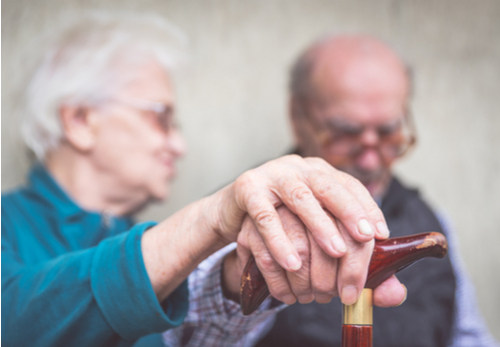
Sedentary Lifestyle
In addition to increasing your risk of developing the cardiovascular conditions listed in the previous section, leading a sedentary lifestyle also increases your risk of dementia. While the specific reasons behind this are not entirely clear, researchers believe that it is due to the changes physical exercise creates in your brain. A lack of physical activity reduces blood flow to your brain, which can lead to damage over time. Aim to get at least 30 minutes of physical activity each day, even if it is just a leisurely stroll.
Smoking
Smoking has major effects on your entire body, not just your lungs. Smoking also affects your heart, brain and entire vascular system. Not only that, but it also increases your risk of developing cardiovascular conditions. The combination of all of these effects significantly increases your risk of dementia. It is never too late to quit smoking. When you quit, the positive effects on your body begin almost immediately and continue to increase over time, so get the help you need to quit right away.
Lack of Cognitive Stimulation
Your brain needs ongoing stimulation to stay sharp. If your lifestyle doesn’t provide much in the way of mental stimulation, you’ll need to go out of your way to get it for yourself. This is common among retirees who no longer have their jobs to keep their minds active. Activities like crossword puzzles and other word games can help stave off cognitive decline. Try to remain socially active as well; interacting with others helps to keep your mind active. Playing games, either in person or online, can help too. Basically, anything you can do to keep your brain as active as possible will help.
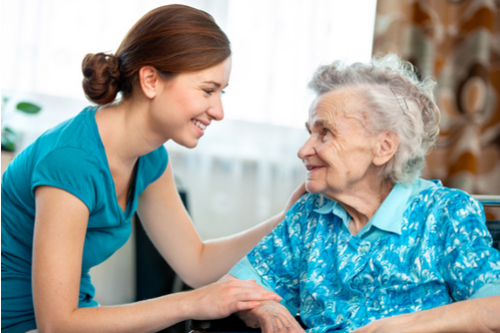
Alcohol Abuse
Consuming too much alcohol on a regular basis can have far-reaching effects, not just on your body, but on your brain as well. Frequent drinking can lead to short-term and long-term memory loss, as well as difficulty forming new memories. Excessive alcohol consumption over a period of many years can also increase a person’s risk of Korsakoff syndrome, an extreme form of dementia. In the past, some scientists believed that occasional drinking could help to prevent cognitive decline, but that notion has fallen by the wayside in recent years.
Depression
People who have experienced bouts of depression in the middle of their lives have increased risk of developing dementia. Scientists are unsure of what exactly causes this connection, but it may carry over into a person’s latter years as well. There is a possibility that depression is a byproduct of dementia in the later stages of life rather than a risk factor, but it is undeniable that the two often go hand in hand. More research will be needed to determine the specific reasons for the connection between depression and dementia.

Caring for Yourself or Your Loved One
If you or someone you love have one or more of the risk factors outlined here, it is never too late to make changes to your lifestyle to help prevent the onset of dementia. However, there may come a time when your loved one needs full time care. Here at Lakeside Manor, we offer best in class Alzheimer’s Care in a cozy residential facility. Reach out to us today to learn more about what we have to offer and how we can help care your loved one.
The post Nine Top Risk Factors for Dementia appeared first on Lakeside Manor.
]]>The post Respite Care San Diego | Everyone Needs a Break appeared first on Lakeside Manor.
]]>
Respite Care San Diego
Manage Feelings of Guilt
Feelings of guilt are often associated with caring for persons who require constant care, however, the best thing you can do for yourself is manage those feelings as soon as you notice them. As a caregiver, you are only as good as you feel. This may sound a little strange but it’s true. If you are not at your best, it is impossible for you to deliver the best care possible to the person you are caring for. If you are experiencing feelings of anxiety and stress, the person you are caring for will feel the effects.
You must always remember, even though your loved one is in a state where it would appear they are completely unaware of what is going on around them, they still have the ability to feel and to sense danger, experience emotional hurt, and have a general sense of something being wrong with the person in charge of their care. This is one of the reasons why respite care is such an important element to add into your treatment plan. Respite Care San Diego affords you the freedom, and grants you the permission you need to be able to take a step back, and just take a much-needed break, so you can refresh and rejuvenate yourself.
You have to understand that it is impossible to be all things to all people, especially to those you are responsible for taking care of. You should also come to understand, you should never feel guilty about taking some time out for yourself, because the truth of the matter is, the time you spend taking care of yourself and doing something you enjoy only enhances your ability to give the person you are caring for the best care possible.

Keeping Everything in Balance
If you are the caregiver for someone who has Alzheimer’s or some other form of dementia, sometimes it can be difficult to take care of all of the tasks you are responsible for in any given day. You may have noticed your loved one is more difficult to handle during certain times of the day. There is a reason for this, and the term associated with this phenomenon is sundowning. Sundowning occurs during the late afternoon to the early evening hours and is triggered when the sun begins to fade. As the evening hours move into nighttime hours, sundowning tends to get worse. Generally, by morning, people tend to be better, but if you are the one who had to provide the care and attention needed during those hours, you are more than likely going to be both emotionally and physically drained.
Respite care can be the answer to helping you find your sense of balance, and help you maintain your physical and mental health. Just knowing you have somewhere safe you can take your loved one can help put your mind at ease while you take a break and partake in activities you enjoy.

Not Just for the Elderly
Respite care is not only for those who are elderly. If you are the primary caregiver for someone who has a chronic or debilitating illness like Downs Syndrome or Multiple Sclerosis, for instance, respite care can benefit you. Often times when persons are being cared for in the home, they tend to feel a certain sense of isolation. If they are elderly, they may have experienced the deaths of several friends, or they may have fallen into a state of depression because they are not socializing at the levels they were accustomed to when they lived independently.
Everyone needs socialization, and everyone needs to feel like their life has a purpose. Respite care can help caregivers and those who care for them by giving those who may feel isolated a place they can go outside of the home. There they can communicate with others in similar situations. They also have the opportunity to socialize with others in their peer group. Sometimes just being around others in similar situations is enough to give those who have lost their sense of independence the will to move forward and make the adjustments needed to accept their current state of being.
Extended and Emergency Care
It is important to recognize, respite care is not only there to give you a break for a few hours, respite care is also available to help you when you need to go out of town for a weekend away, and also times when you need to be gone for a week or more due to an out of town work assignment. You should consider visiting facilities offering respite care in case of an emergency. If for some reason, you needed to place your loved one you, need the comfort of knowing you didn’t just place them somewhere because of desperation. You need to be able to trust the facility caring for your loved one, so visiting respite care facilities before an emergency arises will prevent you from experiencing undue stress at a time when you need it the least.

Remember, respite care is there to take some of the burden away from you, the caregiver. Respite services can be provided in the home, or outside of the home. Respite care services can include, but are not necessarily limited to:
- helping you organize a personalized care plan
- giving you an opportunity to take a break
- taking care of chores around the home like cooking, cleaning, and helping with basic hygiene
- Socialization
- connecting you with support groups
You don’t have to handle everything on your own. There is help available, and caring people who are there to take care of your loved one and give you the peace of mind you need to live a life that is full and healthy. Give a Respite Care facility a call today to see how it can be of service to you.
The post Respite Care San Diego | Everyone Needs a Break appeared first on Lakeside Manor.
]]>The post Choosing a Dementia Residential Care Home appeared first on Lakeside Manor.
]]>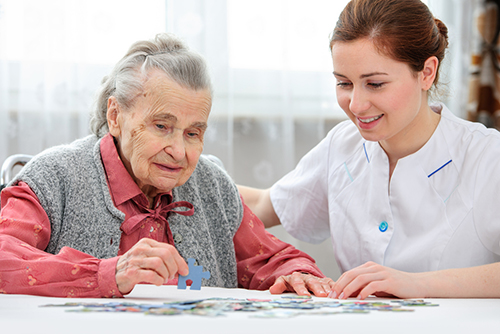
If you struggle with the decision of when to put your loved one into a dementia residential care home, you aren’t alone. More adults find themselves facing the fact that in-home care is more demanding on them than they ever imagined. Most adults have other responsibilities that prevent them from giving the round-the-clock care that dementia patients eventually need. Instead of taking on a burden that isn’t good for you or your loved one, focus on choosing the right home for their dementia care.
Dementia Residential Care Home
Do They Offer Specialized Dementia Care?
People with dementia require very specific types of care. They need to have activities available that will stimulate their brains and extend their memories for as long as possible. A facility that specializes in dementia care does more than provide shelter and a safe environment. They also provide activities and therapy to help their residents enjoy a better quality of life.
Music therapy increases the release of chemicals in the brain that improve mood and reduce stress and agitation. The response to music continues to provide benefits even after the music stops. Most impressive of all is that listening to music can evoke old memories. Providing activities such as crafts also helps. Look for a dementia residential care home that spends time with their residents doing the things that will prolong their memories.

Where Are They Located?
For many adults, it is better to find a care home close to them and not close to the loved one’s former home. Once your loved one leaves home, their condition will only grow worse over time. You and your family must face the reality that they will not return to their home.
What is most important to your loved one is to have family members around them. The support family members provide is vital to the patient’s physical and mental health. They also need support outside of the home, such as taking care of financial needs or managing their property. Having your loved one close to you will also reduce demands on your time if they should become ill and need to go to the hospital.
What Is Their Approach to Dementia Care?
There are different types of dementia and the symptoms vary among different people. Taking the same approach to dementia care will leave some people shortchanged of the personalized care they need. Make sure a care home offers individualized care instead of implementing the same types of treatment for everyone.
What Is Their Policy for Going Outdoors?
There’s a lot of difference between keeping residents safe and keeping them locked away. Dementia patients benefit a great deal from being outdoors. Working in a garden provides even greater benefits as long as the staff monitors gardening activities to ensure safety. Find out if the dementia residential care home you talk with encourages residents to spend time outdoors. Also, ask if they have interactions with their community and/or what types of outdoor activities they provide.
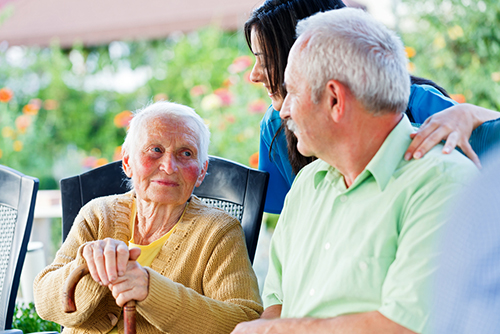
What Is Their Visitor’s Policy?
Ask who you will need to communicate with to get updates about your loved one’s care. Do they have limited visiting hours and, if so, when are they? Keeping track of who comes and goes is an important step in keeping all residents safe and secure. You don’t want your loved one to be “off limits” but you do want a home with a reasonable policy that makes it convenient to visit your loved one.
What Do They Do to Keep Your Loved One Safe?
How is the home set up and what types of security do they have in place? Is there supervision around the clock? How far can your loved one go without getting out of the range of view? An estimated six in ten dementia patients wander. Dementia is a progressive disease and your loved one will continue to decline in their ability to find things and places that they know. You need to know they are protected in case they suddenly try to go somewhere.
Request a Tour
Calling a home on the phone is a good start to having your questions answered and getting some of the information you need to help you make a decision. For example, what kind of living quarters will the home provide to your loved one? Does it have a cozy, at-home feel or more of a clinical one? Ask the home if they provide tours. If not, it isn’t the right place for your loved one. If they are confident in the services they provide, they should agree to show you what it is they do.
If they do offer tours, take along any questions you have about the care they offer for dementia patients. Pay attention to the setting, the workers, and the patients. This is your chance to see firsthand the environment the home provides to dementia patients.

Read Reviews
You aren’t the first adult who has struggled with the decision of which dementia care facility to choose, and you won’t be the last. Reviews offer a window into the care the home provides and can enlighten you about some of the issues you hadn’t thought about before.
Choosing a dementia residential care home for your loved one is one of the hardest things you’ll ever do. Knowing what to ask and what to look for will give you the confidence that you made the right choice. Contact Lakeside Manor today to schedule a tour at a time that’s convenient for you. We specialize in Alzheimer’s and Dementia Care in San Diego.
The post Choosing a Dementia Residential Care Home appeared first on Lakeside Manor.
]]>



